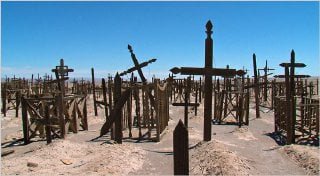Nostalgia for the Light

In Chile's Atacama Desert there is no humidity and nothing lives but it is a place where astronomers believe they can touch the stars. But the area also has a lot of history, much of it hidden. From the native Indians massacred to twentieth century miners, the dead haunt the area, but none more so that the 'disappeared,' whose mothers, wives and sisters sift through the sand around the observatories looking for remains. Writer/director Patricio Guzmán ("The Pinochet Case") makes a profound statement by pairing up these scientists who look into the heavens with the women looking for closure on a devastating political period in "Nostalgia for the Light."
Laura's Review: A-
There is something about the combination of blue and deep orange on the cinema screen. As Guzmán lays the groundwork for his moving essay, one which has a spiritual companionship with Terrence Malick's "The Tree of Life," he shows how Chile's Atacama Desert comprises the only brown spot on our blue planet when seen from space. But the desert has a red blush, one which is reflected in spirals in the the night sky. Guzmán and his editing partner Emmanuelle Joly ("The Witnesses") carefully map the color scheme from the observatory's extraordinary images with cinematographer Katell Djian's ("Nénette") to paint beautiful pictures which become moving not only in the way they are manipulated (a skull photographed to suggest a celestial body) but with the words that accompany them (a survivor of Pinochet's Chacabuco concentration camp traces the mostly obscured names of fellow prisoners on a wall - when he gets to the last, of which only a few letters remains, he says 'I remember him well.'). Gaspar, a young animated astronomer, speaks of his love of the science but also how it leads to the big, spiritual questions of where did we come from and why are we here. As Lautaro, an archeologist, discusses the many mummies found in the desert, Guzmán makes us come to the realization of how they speak from the past just like the light traveling through the cosmos. A man who can draw Pinochet's entire camp from the memories of pacing off the spaces now lives with a wife who has Alzheimer's. Pieces and fragments are found in the sand where satellites sit listening through time, waiting to record the Big Bang. A woman finally accepts the death of a loved one after she finds his foot. A scientist unwraps a mummy for Guzmán's camera and the Indian is a tableaux of another time. The stories continue to amaze, the images astound. The filmmaker finds his most literal connection in Valentina, a young girl whose parents were both 'disappeared,' now working for the astronomers. Guzmán does let the pace of his film fall off a bit towards the end, where his sympathies for the 'mothers of Chile' tilt the balance of what has come before. But this is a provocative work, a documentary that doesn't merely present facts but induces its audience to connect ideas.
Robin's Review: DNS
DNS

